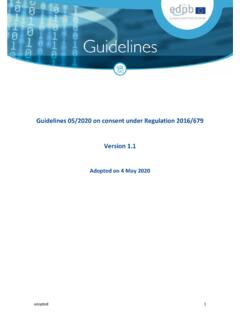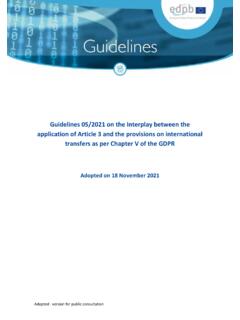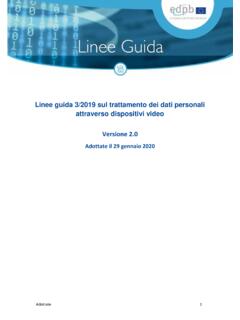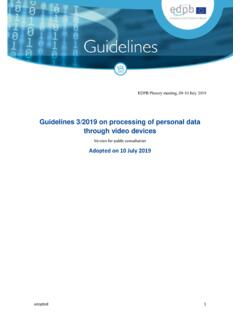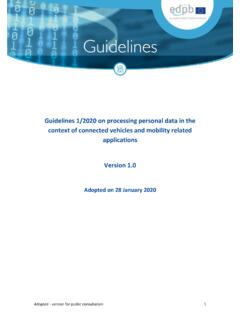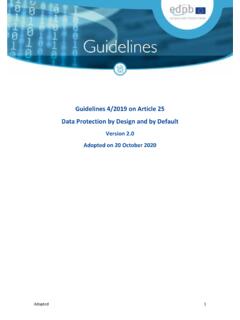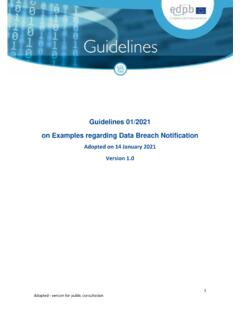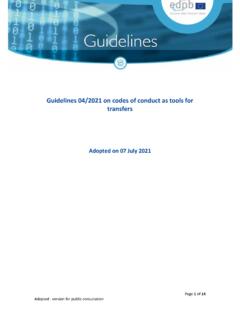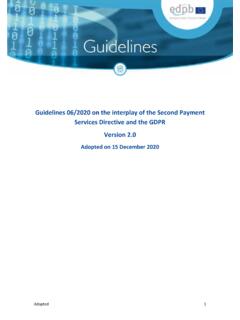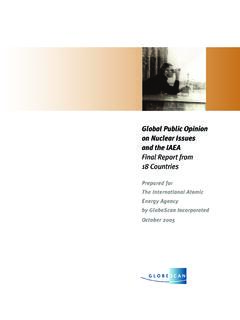Transcription of Opinion 23/2018 on Commission proposals on European ...
1 Opinion 23/2018 on Commission proposals on European Production and Preservation Orders for electronic evidence in criminal matters (Art. ). Adopted on 26 September 2018. Contents 3. 1. Legal basis of the Regulation proposal (article 82 TFUE) .. 4. 2. Necessity of e-Evidence compared to MLATs and EIO .. 5. a) The necessity of e-Evidence compared to the safeguards provided by EIO and MLATs .. 5. b) The abandonment of the dual criminality principle .. 6. c) The consequence of addressing the companies directly .. 7. 3. The new ground for jurisdiction and the so-called disappearance of the location criteria .. 8. 4. The notion service providers should be restricted or complemented by additional safeguards for the data subjects' rights .. 9. 5. The notions of establishment and of legal representative in the context of these proposals should be clearly distinguished from these notions in the context of the GDPR.
2 10. a) Establishment .. 10. b) Legal representative .. 11. 6. New categories of 11. 7. Analysis of the procedures for European Preservation and Protection Orders .. 13. a) Thresholds for issuing orders should be raised and orders shall be issued or authorised by courts .. 14. b) Time-limits to provide data should be justified .. 15. c) European Production and Preservation orders shall not be used to request data of another Member State data subject without at least informing the competent authorities of that Member State, in particular for content data .. 16. d) European preservation orders shall not be used to circumvent data retention obligations of the service providers .. 16. e) Confidentiality and user information .. 16. f) Procedure for the enforcement of an order when the service provider refuses to execute it 17.
3 G) Enforcement of orders and conflicting obligations under third country laws (articles 15 16). 17. h) Security of data transfers when responding to an order .. 19. 20. 2. The European Data Protection Board Having regard to Article 70 (1b) of the Regulation 2016/679/EU of the European Parliament and of the Council of 27 April 2016 on the protection of natural persons with regard to the processing of personal data and on the free movement of such data, and repealing Directive 95/46/EC, HAS ADOPTED FOLLOWING Opinion : Introduction In April 2018, the Commission presented a proposal for a Regulation on European Production and Preservation Orders for electronic evidence in criminal matters and a proposal for a Directive laying down harmonised rules on the appointment of legal representatives for the purposes of gathering evidence in criminal proceedings.
4 The two proposals COM(2018) 225 final and COM(2018) 226 final are complementary. The overall goal pursued by the Commission is to improve cooperation between Member State authorities and services providers, including those based in non-EU countries, and to propose solutions to the problem of determining and enforcing jurisdiction in cyberspace. While the draft Regulation foresees the rules and procedures applicable to issue, serve and enforce preservation and production orders on providers of electronic communication services, the draft Directive provides for minimum rules for the appointment of a legal representative for service providers not established in the EU. In November 20171, before the Commission tabled any draft proposal, the Article 29 Working Party (WP29) recalled the necessity to ensure that any legislative proposal fully complies with the existing EU data protection acquis in particular, as well as EU law and case-law in general.
5 In particular, the WP29 warned against limitations to the rights to data protection and privacy with respect to data processed by telecommunications and information society providers, especially when further processed by law enforcement authorities, recalled the necessity to ensure consistency of any EU instrument with the existing Council of Europe Budapest Convention on cybercrime and with the EU Directive on the European Investigation Order (EIO), and recommended to clarify the respective procedural rules governing access to e-Evidence at national and EU level to ensure that the new instrument would not grant authorities new powers they would not have internally. In addition to these general remarks, the WP29 commented on the legislative options considered by the Commission at that time concerning the categories of data concerned and the corresponding safeguards to access them, on the possibility to address production orders/requests to compel service providers to provide data located outside the EU, and on the substantive and procedural conditions necessary safeguards to surround direct access to data.
6 With the concrete proposals on e-Evidence at hand now, the EDPB wishes to give a more detailed analysis of the proposed legal instruments from a data protection point of view. 1. See WP 29 statement ( ). 3. 1. Legal basis of the Regulation proposal (article 82 TFUE). The legal basis suggested for the e-Evidence draft Regulation is article 82(1) of the TFEU, concerning judicial cooperation in criminal matters, which provides: 1. Judicial cooperation in criminal matters in the Union shall be based on the principle of mutual recognition of judgments and judicial decisions and shall include the approximation of the laws and regulations of the Member States in the areas referred to in paragraph 2 and in Article 83. The European Parliament and the Council, acting in accordance with the ordinary legislative procedure, shall adopt measures to: (a) lay down rules and procedures for ensuring recognition throughout the Union of all forms of judgments and judicial decisions.
7 (b) prevent and settle conflicts of jurisdiction between Member States;. (c) support the training of the judiciary and judicial staff;. (d) facilitate cooperation between judicial or equivalent authorities of the Member States in relation to proceedings in criminal matters and the enforcement of decisions.. As underlined by the Commission in the impact assessment accompanying the proposals , Article 82(1). specifies that judicial cooperation in criminal matters shall be based on the principle of mutual recognition. This legal basis would cover possible legislation on direct cooperation with service providers, in which the authority in the issuing Member State would directly address an entity (the service provider) in the executing State and even impose obligations on it. This would introduce a new dimension in mutual recognition, beyond the traditional judicial cooperation in the Union, so far based on procedures involving two judicial authorities, one in the issuing State and another in the executing State.
8 (emphasis added). Given the novelty of the use of this legal basis in the context of direct requests between public authorities and private parties, the EDPB regrets that no further analysis nor assessment is provided by the Commission . Indeed, as already underlined by the Working Party in its previous statement, the EDPB continues to stress its doubts on the appropriateness of this legal basis, which are supported by the analysis of the CJEU and its Advocate General in the Opinion 1/15. Among the developments made concerning the validity of Article 82 as a legal basis for the draft PNR agreement between the EU and Canada, the Court underlined that the Canadian Competent authority does not constitute a judicial authority, nor does it constitute an equivalent authority 2. In the context of the e-Evidence proposals , one of the main goal pursued as stated by the Commission appears to be to avoid the too cumbersome judicial cooperation.
9 Consequently, the proposal is based on the principle that cooperation should take place between an authority and a service provider rather than between two authorities. The procedure foreseen primarily places private entities in the position to be the receiving party and to answer the requests emanating from judicial authorities. The EDPB notes that the process of enforcing production or preservation orders could imply the involvement of a receiving authority in the situation where the receiving service provider does not comply with its obligations and will thus trigger the need to call for an ex-post enforcement of the order. However, as the main objective of the procedure set up is precisely not to involve a receiving 2. See point 103 of Opinion 1/15 and point 108 of the Opinion of the advocate general in this case. 4.
10 Authority, the EDPB doubts that this ancillary procedure could justify the use of Article 82 as the sole legal basis for the instrument. Therefore, the EDPB takes the view that for Article 82 to be used as a legal basis the main procedural steps of the cooperation shall take place between two judicial authorities and that another legal basis should be used for this type of cooperation. 2. Necessity of e-Evidence compared to MLATs and EIO. The EDPB notes that the Commission is committed to review obstacles to criminal investigation, especially regarding the issue of access to electronic evidence. In its explanatory memorandum, the Commission gives the context of the proposal and stresses the volatile nature of electronic evidence, its international dimension as well as the need to adapt cooperation mechanism to the digital age.
